
GB Eyelet
DE Öse
DK Øje
FR Œillet
NL Oogje
GB Eyelet
DE Öse
DK Øje
FR Œillet
NL Oogje
GB Sleeve for roof pole
DE Kanal für Dachstange
DK Stangkanal til tagstangen
FR Gaine pour mât de toit
NL Hoes voor de dakstok
GB Roof pole
DE Dachstange
DK Tagstang
FR Mât de toit
NL Dakstok
GB Double clip-on hooks
DE Doppelte Clip-on-Haken
DK Dobbelte kroge
FR Crochets doubles à clipser
NL Dubbele vast te klikken
haken
RAPTOR
robens.de
robens.co.uk
Congratulation on your new
Robens Tent designed and
created to accompany you out
into the great outdoors.
When selecting your campsite,
the ideal place would be an area
as even and clean of rocks,
branches and other sharp objects
as possible.
Spread out the tent and place it
with the doors facing the desired
directions, avoid placing the tent
directly under trees, and position it
with the end facing the direction of
the wind, for best results in windy
conditions.
Assemble and raise the tent
1
Assemble all of the poles by
interlocking shock-corded poles.
Make sure before pushing the
poles through the pole sleeves
that all doors are closed.
Now gently push the red poles
through the outside openings on
the y until they come to a stop in
the webbing pockets at the ends
of the sleeves.
2
The tent can now be raised.
Place one end of a pole down into
its “Fast-Foot” plastic cup applying
pressure to the pole forming an
arch and then pull on the strap
with the buckle near the opening
of the sleeve to get the pole
properly tensioned. Repeat this
with the other pole.
Now you are able to position the
tent as you require. Peg down the
fabric loops at the rear corners of
the tent and then pull at the front
until the tent is erected and well
tensioned. Peg down the front
corners and the other loops all
way around the tent.
3
Push the grey pole into the
sleeve on the roof. Fasten the
ends in the eyelets at the outer
corners of the porches and clip on
the plastic hooks.
Finally secure the tent against
strong winds with the pre-attached
guylines and pegs. Use a mallet to
secure the pegs in the ground but
be careful of your hands and feet
when hitting the peg.
Please turn over for more
information and tips on
maintenance.
Check out www.robens.de/tv for
pitching lm and tips
GB DE DK FR NL
Wir beglückwünschen Sie zum
Kauf Ihres neuen Robens Zeltes
und wünschen Ihnen, dass Sie
hiermit viele schöne Touren
machen werden!
Merken Sie sich beim Önen
des Transportsacks und
Herausziehen des Zeltes wie
alles zusammengepackt ist. Das
wird Ihnen später das Verpacken
erleichtern.
Bei der Auswahl des Aufbauplatzes
achten Sie bitte darauf, dass er
möglichst frei ist von Steinen,
Ästen oder anderen scharfkantigen
Objekten, und vermeiden Sie, das
Zelt unter Bäumen aufzubauen.
Breiten Sie das Zelt aus, mit dem
Eingang in der gewünschten
Richtung (alle Eingänge sollten
geschlossen sein). Und platzieren Sie
das Heck in Windrichtung für höhere
Windstabilität.
Aufbau des Zeltes
1
Setzen Sie nun die mit Gummizug
verbundenen Gestänge zusammen
und schieben Sie sie die roten
Stangen in die außen am Überzelt
bendlichen Önungen bis sich die
Enden in den Gurtbandtaschen
auf der gegenüberliegenden Seite
benden.
2
Stecken Sie ein Gestängeende in
den dazugehörigen Kunststoköcher
wobei die Stange einen Bogen
formt. Mit dem Gurtband an den
Gestängeönung können Sie die
Spannung einstellen. Verfahren Sie
ebenso mit der anderen Stange.
Nachdem Sie die Position des Zeltes
überprüft haben, befestigen Sie das
dem Wind zugewandte Ende mit
Heringen, ziehen Sie dann das Zelt
auf bis es gut gespannt steht, und
xieren Sie es an der vorderen Apsis.
3
Schieben Sie die graue Stange
in den Kanal oben auf dem Zelt,
stecken Sie die Enden in die Ösen
an den Spitzen der Apsiden und
befestigen Sie die Kunststohaken.
Jetzt können Sie das Zelt komplett
mit Heringen sichern. Sichern
Sie zum Schluss das Zelt mit den
Sturmleinen, zum Schutz vor starkem
Wind. Benutzen Sie zum Verankern
der Heringe im Boden einen
Camping-Hammer, aber seien Sie
bitte vorsichtig, damit Sie sich dabei
nicht an den Händen oder Füßen
verletzen.
Für weitere Tipps und Informationen
wenden Sie bitte dieses Blatt.
Tipps und Videos zum Aufbau nden
Sie auf www.robens.de/tv
Tillykke med dit nye Robens
telt, som er designet og
udviklet til at følge dig på store
oplevelser ude i naturen.
Den ideelle lejrplads er et område,
der er så jævnt som muligt og
uden skarpe genstande som f.eks.
sten og grene.
Bred teltet ud, og placer det med
dørene i de ønskede retninger.
Undgå at placere det direkte under
træer. I blæsevejr opnås den
bedste vindstabilitet ved at placere
teltet med bagsiden mod vinden.
Samling og opsætning af teltet
1
Sæt alle de elastikforbundne
stænger sammen. Kontroller, at
alle døre er lukket, før stængerne
føres gennem kanalerne.
Skub nu forsigtigt de røde stænger
gennem kanalerne, indtil de
stopper i lommerne for enden af
kanalerne.
2
Nu kan teltet sættes op. Placer
stangens ene ende i “Fast-Foot”
plastikhylstret ved at trykke på
stangen, så der formes en bue,
og træk derefter i stroppen med
spændet ved kanalens åbning
for at spænde stangen godt fast.
Gentag proceduren med den
anden stang.
Nu kan du placere teltet,
som du ønsker. Sæt pløkker i
stofstopperne i teltets bagerste
hjørner, og træk i teltets forside,
indtil teltet er rejst og strammet
godt op. Sæt pløkker i de forreste
hjørner og i de øvrige stropper
hele vejen rundt om teltet.
3
Skub nu den grå stang gennem
tværkanalen ovenpå teltet og sæt
enderne i øjerne på
stropperne ved
hver apsis og fastgør derefter
plastkrogene på stangen.
Til sidst sikres teltet mod stærk
vind med de formonterede
barduner og pløkker. Brug en
pløkhammer til at slå pløkkerne
i, men pas på ikke at ramme
hænder og fødder.
Se næste side for ere
oplysninger om vedligeholdelse.
Se opstillingslm og tips på
www.robens.de/tv
Félicitations pour l’achat de votre
nouvelle tente Robens, conçue
et créée pour vous accompagner
dans vos excursions en pleine
nature.
Lorsque vous choisissez une aire de
camping, préférez une surface aussi
plane que possible et sans cailloux,
branches et autres objets pointus.
Étalez la tente au sol et mettez les
portes dans la direction désirée.
Évitez d’installer la tente directement
sous un arbre et orientez l’arrière
face au vent, pour plus de confort par
temps venteux.
Montage de la tente
1
Assemblez tous les mâts en
emboîtant les sections à cordon
élastique. Avant d’insérer les mâts
dans les gaines, assurez-vous que
toutes les portes sont fermées.
Insérez ensuite doucement les mâts
dans les gaines correspondantes, en
poussant jusqu’à arriver en butée au
niveau des poches de sangle.
2
La tente peut maintenant être
dressée. Insérez une extrémité du
mât dans le support en plastique Fast
Foot, en mettant le mât sous tension
pour le plier en arceau, puis tirez la
sangle à boucle vers l’ouverture de la
gaine pour obtenir la tension de mât
appropriée. Cette opération est plus
facile si vous pliez davantage le mât.
Répétez cette opération avec l’autre
mât. Vous pouvez maintenant installer
la tente où vous le désirez. Fixez au
sol les boucles en tissu situées aux
coins arrière de la tente, puis tirez sur
la partie avant jusqu’à ce que la tente
soit dressée et correctement mise
en tension. Fixez au sol les coins
avant de la tente et toutes les autres
boucles, à l’aide de piquets.Fixez au
sol les capotes d’aération à l’aide des
haubans fournis.
3
Poussez le mât gris à l’intérieur
de la gaine du toit. Attachez les
extrémités dans les œillets aux
coins extérieurs des porches et
xez les crochets en plastique.
Enn, arrimez solidement la tente
contre les vents forts avec les
haubans pré-attachés et des piquets.
En veillant à ne pas vous blesser,
utilisez un maillet pour enfoncer les
piquets dans le sol.
Consultez le verso de cette notice
pour plus d’informations et de conseils
sur l’entretien de la tente.
Allez sur www.robens.de/tv pour
découvrir une vidéo et des conseils
de montage
Gefeliciteerd met uw nieuwe
Robens tent, ontworpen voor
jarenlange trouwe dienst in het
open veld!
Bij het kiezen van de
kampeerplaats is de beste plek
een stuk grond dat gelijkmatig
is en waar zo weinig mogelijk
stenen, takken of andere objecten
liggen.
Spreid de tent uit en leg hem
met de ingangen in de gewenste
richtingen. Probeer de tent niet
direct onder bomen te zetten en
plaats hem met de achterkant in
de windrichting. Zo weerstaat hij
beter winderige omstandigheden.
In elkaar zetten en opzetten van
de tent
1
Zet alle stokken in elkaar door
de stokken met amortiseurkoorden
aan elkaar te zetten. Zorg ervoor
dat alle deuren gesloten zijn
voordat u de stokken door de
stokhoezen steekt.
Steek nu voorzichtig de stokken
door de stokhoezen tot ze niet
meer verder kunnen door het net
aan het eind van de hoezen.
2
De tent kan nu rechtop gezet
worden. Steek één uiteinde van
een stok in de “Fast-Foot” plastic
dop en oefen druk uit op de stok
door een boog te vormen en trek
vervolgens aan het riempje met
de gesp bij de opening van de
hoes om de stok te spannen.
Herhaal dit voor de andere stok.
De tent kan nu naar wens worden
geplaatst. Zet de stoen lussen
aan de achterhoeken van de
tent vast met scharnieren en trek
vervolgens aan de voorkant tot de
tent recht en strak staat. Zet de
voorhoeken en de andere lussen
rond de tent vast.
3
Duw de grijze stok in de
hoes op het dak. Maak de
uiteinden vast aan de ogen in de
buitenhoeken van de leefruimte en
klem de plastic haken vast.
Zet de ventilatiekappen vast met
de scheerlijnen en haringen.
Gebruik de voorbevestigde
scheerlijnen en haringen om te
zorgen dat de tent in harde wind
kan blijven staan. Gebruik een
hamer om de haringen in de
grond vast te zetten, maar let op
uw handen en voeten als u op de
haringen slaat.
Sla de bladzijde om voor meer
informatie en onderhoudstips.
Ga naar www.robens.de/tv voor een
video en tips over het opzetten van
tenten
GB Openings of the inside pole sleeves
DE Önung des Gestängekanals
DK Åbninger i de indvendige kanaler
FR Ouvertures sur les gaines de mât intérieures
NL Openingen aan de binnenkant van de stokhoezen
GB “Fast-Foot” Plastic cups
DE Gestängeköcher
DK Fast-Foot plastikhylstre
FR Supports en plastique Fast Foot
NL “Fast-Foot” plastic dopjes
GB Webbing pockets for the pole ends
DE Taschen zur Aufnahme der Gestängeenden
DK Lommer til stænger
FR Poches pour mât
NL Stokhoezen
1
2
3
© 09/2016 Oase Outdoors ApS


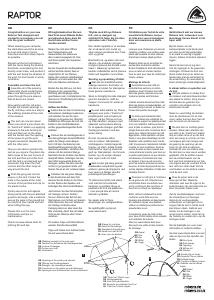

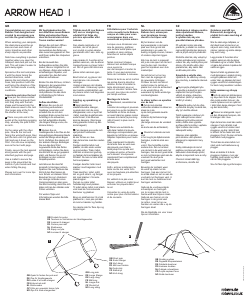
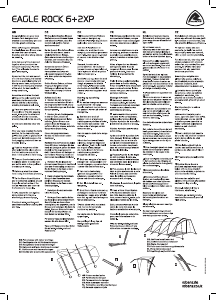
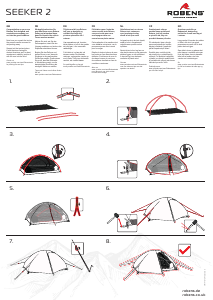
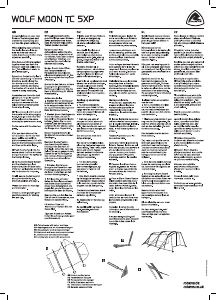
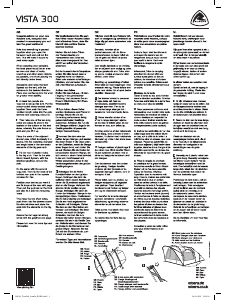
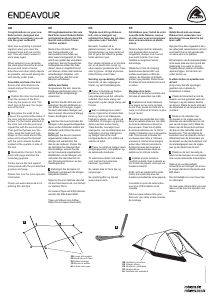
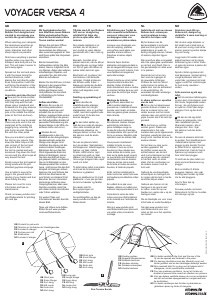
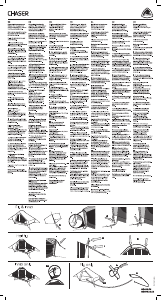
Join the conversation about this product
Here you can share what you think about the Robens Raptor Tent. If you have a question, first carefully read the manual. Requesting a manual can be done by using our contact form.